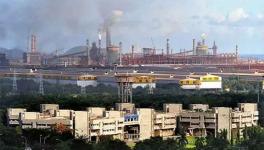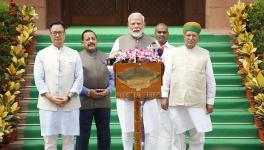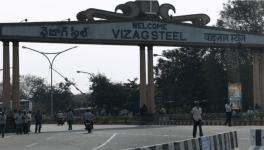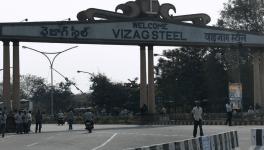Increased Property Tax and Municipal Reforms Spark Protest in Andhra Pradesh
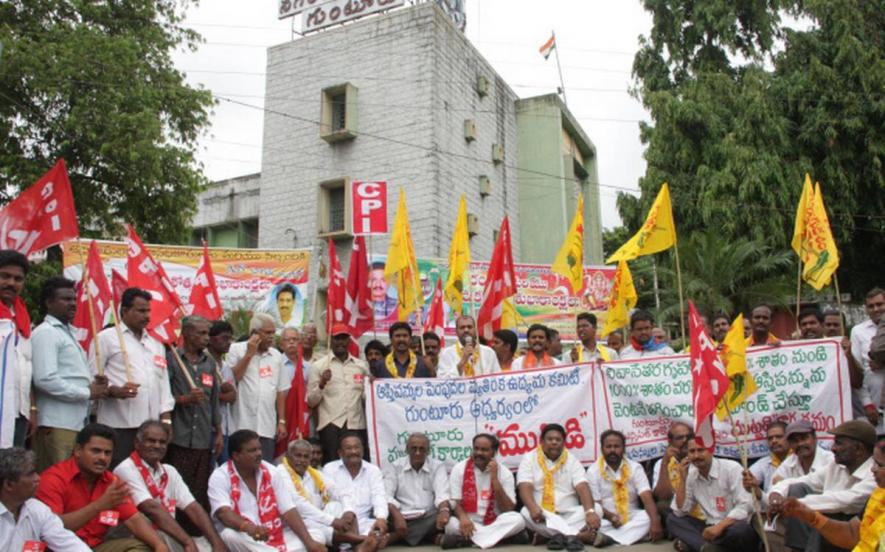
Image Courtesy: The Hindu
For the last three days, members of Andhra Pradesh Urban Citizens Federation (APUCF) and several citizen rights’ groups have been protesting against the steep hike in property tax in front of the offices of municipal corporations and municipalities across Andhra Pradesh. They are demanding that the YSR Congress Party-led state government withdraw its recent amendments to the municipal laws and bring back the earlier system of levying taxes.
“The property tax has been raised in an undemocratic manner when there was no elected council and even public opinion was not taken into account. APUCF along with other rights bodies will form a state-wide united action committee to intensify the stir until the new reforms are taken back,” said CH Babu Rao, Convenor of Andhra Pradesh Urban Citizens Federation (APUCF).
In November 2019, the state government issued the Andhra Pradesh
Municipal Laws (Second Amendment) Ordinance, 2020, bringing in new changes in the levying of property tax, user fee for solid management and sewage systems. Following this, the government issued three Government Orders 196, 197 and 198 notifying guidelines of the new municipal system in the state.
According to the new system, the property tax is levied based on the market price of the property as against the earlier method of levying tax based on the rental value of the property. The state government is likely to increase its revenue by an estimated Rs 6,000-crore through the measure.
It is to be noted that the reforms are in line with the urban local bodies reform proposed by the central government. In May last year, the central government enhanced the borrowing limits of the states from 3% to 5% of their Gross State Domestic Product (GSDP) as a COVID-19 special package. However, 1% of the increased limit was linked to four reforms in the universalisation of ‘One Nation One Ration card’, ease of doing business, power sector and reforms of urban local bodies.
So far, three states -- Andhra Pradesh, Madhya Pradesh and Telangana -- have implemented the reforms and became eligible for borrowing amount equivalent to 0.25% of their GSDP through open market borrowings.
“The YSRCP government has already implemented power and urban local bodies reforms despite strong opposition from farmers and middle classes. The YSRCP government calls itself a welfare government but it is burdening the lower and middle classes with massive increases in property tax when the people are reeling under the COVID-19 induced economic crisis. It is clear that the CM Jagan Mohan Reddy-led government has now surrendered to the BJP at the Centre,” said Babu Rao.
Addressing a gathering at a protest in Vijayawada, MLC Lakshmana Rao said that the municipal reforms were brought in by the government in spite of objections raised by the MLCs of Progressive Democratic Front (PDF).
In December last year, the Federation of Andhra Pradesh Chambers of Commerce and Industry (FAPCCI) appealed to the state government to defer the changed system of property tax. C V Atchut Rao, president of FAPCCI, in a statement said that the rental values have fallen all over the state and many commercial establishments were closed.
Observers point out that many industrial establishments will be impacted with the new system owing to the COVID-19 pandemic-induced economic crisis.
“On one side, the government drastically reduces the taxes for big corporates, but burdened lower and middle classes with increased property tax,” said Babu Rao.
Get the latest reports & analysis with people's perspective on Protests, movements & deep analytical videos, discussions of the current affairs in your Telegram app. Subscribe to NewsClick's Telegram channel & get Real-Time updates on stories, as they get published on our website.










